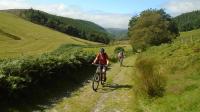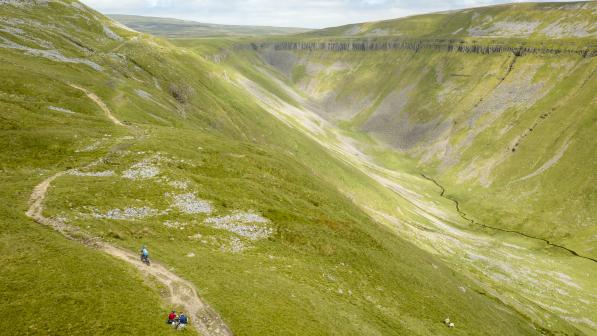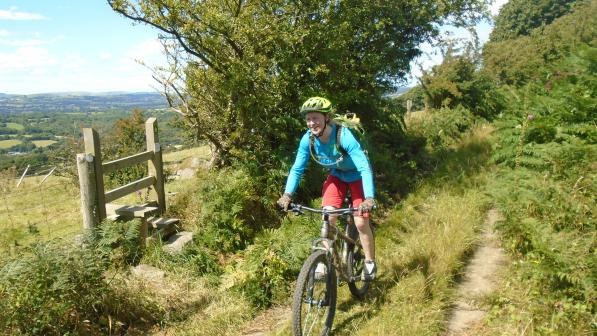Opening up the Welsh countryside makes economic sense, says Cycling UK

Why is the Welsh Government proposing to change the law on access to its Public Rights of Way network and lift certain restrictions on access for outdoor activities? Is this a turning point for cycling?
Yes, we believe it could be. The proposals could transform exploring the natural environment by cycle, and that's why we need you to take action by Saturday 30 September.
What the consultation is proposing
The consultation, Taking Forward Wales’ Sustainable Management of Natural Resources, includes ground-breaking plans to increase access across the rights of way network in Wales. It also covers restrictions on Open Access Land (i.e. land mapped as ‘open country’ or registered common land under the Countryside and Rights of Way Act 2000 (CROW) Act), which makes up around a fifth of Wales.
The Cabinet Secretary for Environment and Rural Affairs, Lesley Griffiths, states in the consultation documents that the proposals seek to ensure the “delivery of long-term economic, social, cultural and environmental benefits”, arguing that the challenges surrounding the UK’s exit from the EU also presented "new opportunities for Wales to pursue the sustainable management of natural resources".
Perhaps this is the start of more joined-up thinking and recognising the economic benefits of promoting outdoor recreation, something which MPs in Westminster also accepted last year.
The current situation
At the moment, access is granted to those on foot across both Open Access Land and all of the rights of way network, whilst cyclists and horse riders have permitted access to only 21% of the network.
Businesses in rural areas often rely on the money tourists spend, so restricting access to certain user groups does nothing to promote the growth and sustainability of the Welsh economy. This is an important consideration given the pending disappearance of EU funding for agricultural subsidies, rural development and countryside management.
Outdoor activity tourism and the Welsh economy
We know from a study of the ‘Economic Impact of Outdoor Activity Tourism in Wales’, conducted by Visit Wales, how important the tourism sector is to the Welsh economy.
The study found that demand for experience and lifestyle-orientated holidays, as well as outdoor activity tourism, has been a catalyst for economic growth in rural areas in recent years. The total estimated annual contribution of outdoor activity tourism in Wales is approximately £481 million, 8000+ jobs, and a further £304 million in value added activity.
Cycling’s potential contribution
We've always argued that policies to promote cycling benefit public health significantly, but the economic case that cycling can support the outdoor tourism sector has seldom been advanced with much conviction.
Yet, extending access rights for cyclists and horse riders, together with lifting restrictions on Open Access Land, could well bring wider benefits for individuals, communities, local businesses and the Welsh rural economy as a whole.
Moreover, the idea that Wales has the potential to be amongst the best destinations for off-road cycling and mountain biking in the world is fast becoming a reality, and has already begun to embed itself in the plans and minds of rural communities.
In fact, the economic prosperity of North Wales is becoming increasingly dependent on the income generated by visitors enjoying the countryside, which include people who go there to ride their bikes.
Commenting on the Welsh Government's proposals, Colin Down, Director of Flattyres MTB in Snowdonia, said that the current access restrictions were "counterproductive to economic growth in rural communities". In contrast, he welcomes the new proposals because they would "help change behaviour and create an environment where access would not be restricted to car or foot", a development that could encourage overnight stays and increase spend in the region.
Also, if access restrictions are lifted, a variety of cycle routes could be made available in the best riding locations, with options suited to every level of skill or fitness, giving people an incentive to stay overnight and enjoy local facilities and services. Promoting more rural routes would also enable the tourism benefits to be harnessed outside the usual honeypot areas.
To maximise those benefits, however, mountain biking needs to be more accessible and off-road cycling needs to attract a wider demographic, including children and families. The Welsh Government’s proposals reflect this, as does Cycling UK’s own research. We found, for instance, that riders - particularly novices - regard way marking as an important factor in choosing where to ride. Updating access laws, though, should mean that the natural environment is more efficiently managed, and we could say good-bye to restrictions based on user type – restrictions that bear no relation to how suitable paths actually are for particular users.
The wider picture
In Scotland, the Land Reform Act 2003 has already increased access rights for cyclists and horse riders, which helped the tourism sector - Transform Scotland has estimated that the Scottish economy has benefited from an additional £358 million each year.
Fortunately, the Welsh Government has clearly recognised the potential economic benefits, announcing that their aim is for Wales to become a ‘World Class Destination for Outdoor Pursuits’, drafting their proposals to ensure that increased access also brings knock-on benefits for the health of the nation, the prosperity of its population and the robustness of its rural tourism industry.
Responding to the consultation – act now
Cycling UK’s response to ‘Taking Forward Wales’ outlines our support for the Welsh Government’s proposals to open up 14,000 miles of traffic-free cycle routes, with the more general call for more access for outdoor recreational activities made by the Outdoor Access Wales alliance and its members. Cycling UK’s ‘Trails for Wales’ campaign, which has already generated over 7,000 signatures, clearly shows the public desire for the relaxation and modernisation of access laws.
So, if your views match those reflected in Cycling UK ‘Rides of Way’ report into off-road cycling, and you're one of the 74% who believe the existing public rights of way network is not suitable for modern cycle usage, or one of the 87% who believe the existing public rights of way network makes it difficult to put together a legal route, then please support Cycling UK's 'Trails for Wales' campaign before the consultation closes on Saturday 30 September.
You can do so via our online action, and remember this isn't just for people in Wales. It affects anyone who might visit Wales. And of course, if Wales follows Scotland in extending access rights, we might have some questions to put to Westminster as a result.

